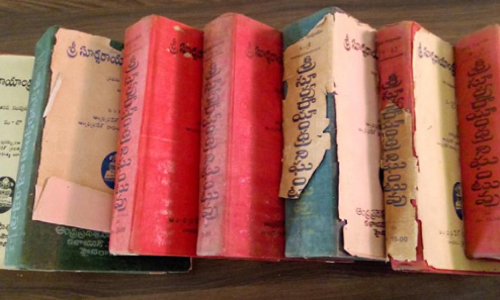Herculean task of compiling Suryarayandhra dictionary

A Herculean task of involving 40 eminent scholars of yore who sweat it out for over six decades went in to compile eight volumes of the dictionary that featured over 1.1-lakh entries giving full information about each entry like origin of word, meaning, synonyms and their use by poets and so on.
Pithapuram: A Herculean task of involving 40 eminent scholars of yore who sweat it out for over six decades went in to compile eight volumes of the dictionary that featured over 1.1-lakh entries giving full information about each entry like origin of word, meaning, synonyms and their use by poets and so on.
In spite of over 200 Telugu dictionaries available in the market, the Suryarayandhra Nighantuvu earned the reputation of being the most comprehensive. Expenditure in compiling the monumental work ran into several lakhs of rupees.
The dictionary is synonymous with the love the Maharajah of Pithapuram – the late Rao Venkata Kumara Mahipati Suryarao Bahaddur – had for the mother tongue, Telugu. Jayanti Ramaiah, who was appointed editor of the dictionary, accelerated the compilation work.
During the British rule, the Maharajahs and Zamindars had little work to do. While many indulged in pleasure-seeking, the Rajah of Pithapuram dedicated his time to the promotion of mother tongue, literary development and promoting educational institutions.
The efforts of Maharajah’s Diwan, Mokkapati Subbrayudu, were laudable in the compilation of the dictionary. Deriving inspiration from the Diwan, the Maharajah took a lot of initiative in getting the dictionary compiled. To their efforts, Jayanti Ramaiah Pantulu, a magistrate in the Madras Presidency, lent his hand to finish the work.
The trio met at Dunmore House in Madras on March 26, 1911 and arranged a meeting of scholars. The meeting was attended by eminent persons like Kandukuri Veeresalingam, Vedam Venkataraya Sastry, Chennapragada Bhanumurthy, Goteti Kanakaraju, Vavilikolanu Subba Rao and Komarraju Venkatalakshmana Rao. Veeresalingam proposed the necessity to have a comprehensive dictionary for Telugu language. The Maharajah of Pithapuram came forward to give the money needed to compile a dictionary.
The Pithapuram Maharajah on May 12, 1911 constituted a Saraswata Parishad and fixed the objective of compiling the dictionary is to incorporate etymological significance of words and the word origins and such other information in the proposed dictionary.
A dictionary compilation committee has been constituted with Vedam Venkataraya Sastry as the editor and Jayanti Ramaiah as the executive. The compilation work did not progress much even after two years of formation of the committee. The office of the dictionary compilation work has been shifted to Pithapuram from Madras. Jayanti Ramaiah was made editor of the dictionary. From then onwards the compilation work progressed.
Some of the literary greats who worked to compile the dictionary were: Tanjanagaram Tevapperumallaiah, Puranapanda Mallayya Sastry, Kuchi Narasimham, Charla Narayana Sastry, Pisupati Chidambara Sastry, Vemparala Suryanarayana Sastry, Darbha Sarveswara Sastry, Samavedam Sriramamurthy Sastry, Pannala Venkatadribhatta Sarma, Chilukuri Veerabhadra Sastry, Akundi Venkata Sastry, Prayaga Venkatarama Sastry and so on.
On account of the sustained team work of these literary greats, the first volume of the dictionary was released in April 1936. Besides the Maharajah of Pithapuram, Sarvepalli Radhakrishnaiah, Vepapa Ramesam, Kasinadhuni Nageswara Rao, Kasi Krishnacharyulu, Korada Ramakrishnaiah, Nelaturi Venkata Ramanaiah, Bangalore Nagaratnamma, Puranam Suryanarayana Teerthulu and others took part in the release function.
The compilation of the dictionary began in 1911 and concluded in 1972. During the interregnum, several hurdles surfaced and four editors were changed. The first volume was released in 1936, the second one was released in 1939 and the third one was released on 1942. The fourth volume was out in 1944.
While the fifth, sixth and seventh volumes were released in 1958, the last one was released in 1972. The project is highly cost intensive. The expenditure incurred for compiling four volumes was estimated to be around Rs 20 lakh. The dictionary was priced very low to enable many people to buy it. The proceeds on the sale of dictionary were not great.
After 1947, because of independence to the country the princely states were merged with the government result of which the Pithapuram Maharajah suffered heavy loss. Therefore, the Maharajah could not extend financial support to the compilation work. As a result, the fifth volume of the dictionary was delayed much.
However, with the support from the composite Madras State the fifth, sixth and seventh volumes were completed. The eighth edition saw light because of the efforts of Diwakarla Venkata Avadhani and Patibanda Madhava Sarma. According to the scholars, Suryarayandhra dictionary is far better compared to other works like Andhra Vachaspatyam, Lakshminarayaneeyam, Sabdhardha Chandrika, Andhrapada Parijatam and Sabdha Ratnakaram.
The dictionary incorporated even legislative terminology. It featured 1.1-lakh terms with their comprehensive meanings. However, the dictionary was equally criticised by scholars. The main criticism was that there was no space for colloquial language in the dictionary. Noted scholars Gidugu Ramamurthy and Vadlamudi Venkata Ratnam termed it not comprehensive and full of errors. They wrote innumerable articles criticising the dictionary.
By Saride Nageswara Rao








